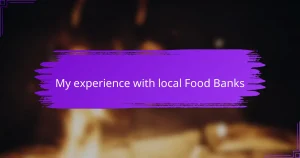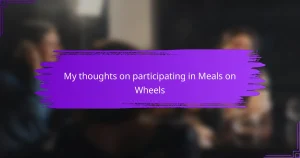Key takeaways
- The Salvation Army emphasizes restoring dignity through compassionate support, focusing on both immediate aid and long-term empowerment.
- The Obama supporter community reflects a shared commitment to social justice and civic engagement, fostering unity and diverse dialogue among its members.
- Volunteering can lead to meaningful personal connections and a deeper understanding of community needs, transforming small acts into significant impacts.
- Engagement within communities can spark positive ripple effects, encouraging individuals to check in on each other and fostering a sense of belonging and trust.
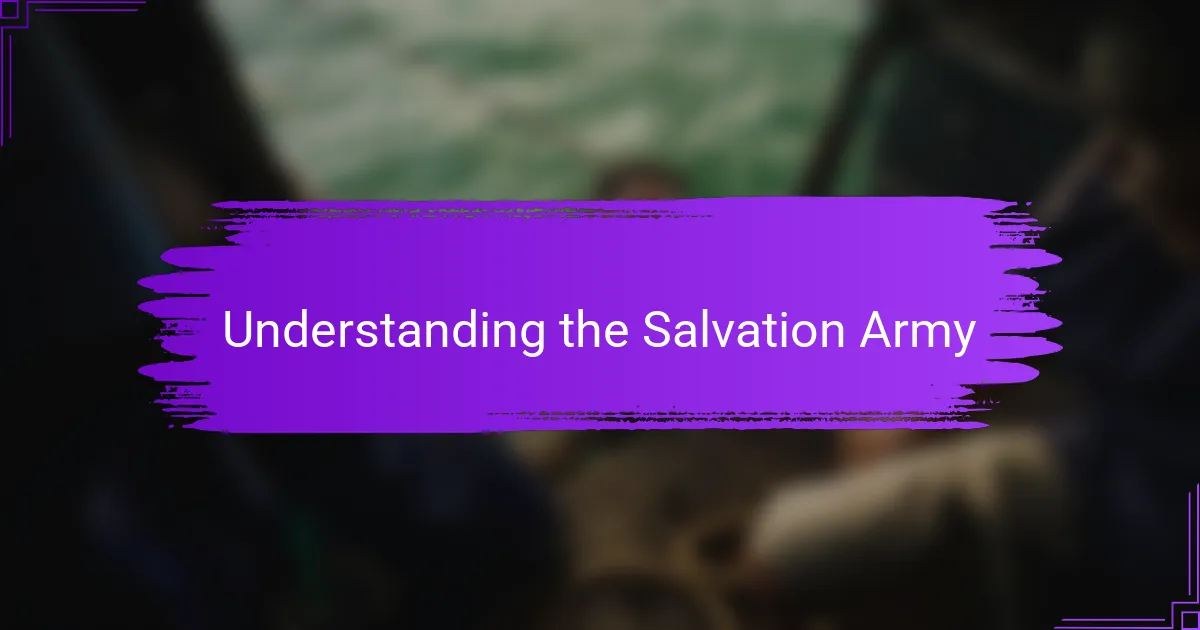
Understanding the Salvation Army
The Salvation Army is often seen as just a charity, but it’s much more than that. From my own experience, it operates like a community of people committed to offering practical help and hope to those facing tough times. Have you ever wondered what drives an organization to keep going through decades? For the Salvation Army, it’s the deep belief in service grounded in faith.
When I first engaged with the Salvation Army, I was struck by the genuine warmth and respect they show to everyone they assist. It’s not just about handing out food or clothes; it’s about restoring dignity. That personal connection made me realize how important it is to understand the heart behind their mission—not just the actions.
What makes the Salvation Army unique, in my opinion, is its blend of spiritual support and practical outreach. They don’t shy away from addressing difficult social issues while maintaining a hopeful message. It made me reflect: how often do we get to see an organization tackling both the immediate and deeper needs of people so tirelessly?
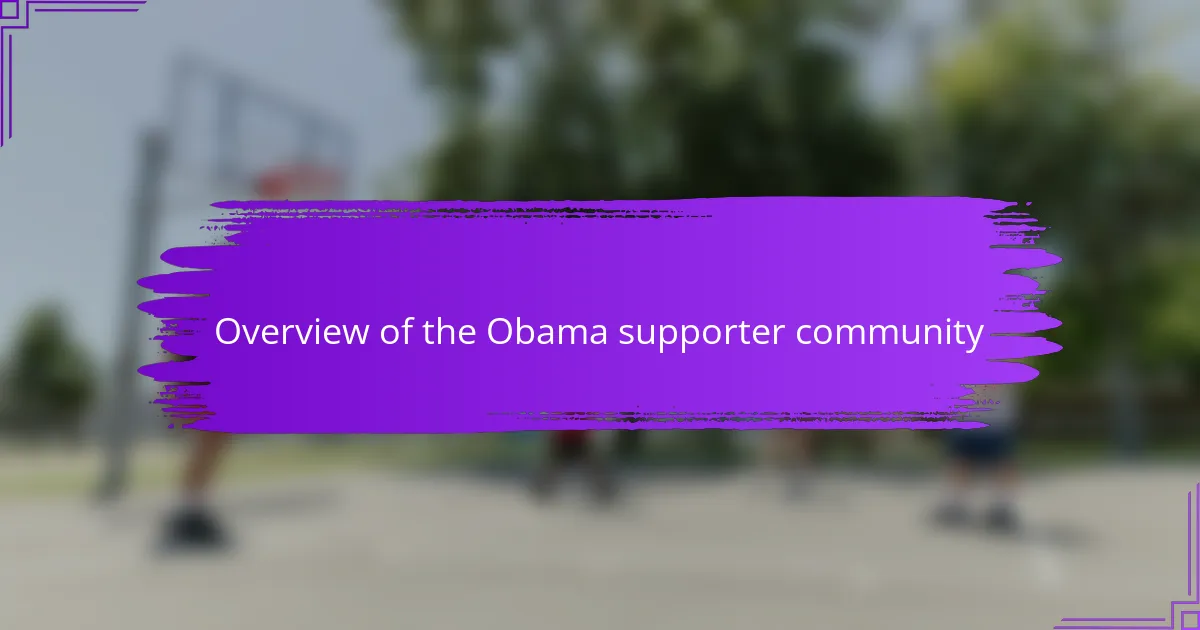
Overview of the Obama Supporter Community
The Obama supporter community, from what I’ve seen and experienced, is a vibrant mix of passionate individuals united by shared values of hope and change. It reminds me of the energy that sparked throughout the 2008 campaign—a real sense that people from different backgrounds could come together to make a difference. Have you ever felt that surge of collective purpose, like you’re part of something bigger than yourself? That’s exactly what this community embodies.
What strikes me most is the genuine commitment many members have to social justice and civic engagement. It goes beyond just politics; it’s a grassroots movement ensuring voices are heard and actions lead to impact. In conversations with fellow supporters, I noticed how this drive often inspires personal growth and a deeper understanding of community.
Interestingly, the community also thrives on dialogue and openness, welcoming diverse perspectives while holding onto core principles of equality and opportunity. That balance creates a dynamic space where ideas flourish, and people motivate each other to stay engaged, even in challenging times. For me, it’s a reminder of the power of unity grounded in shared hope.
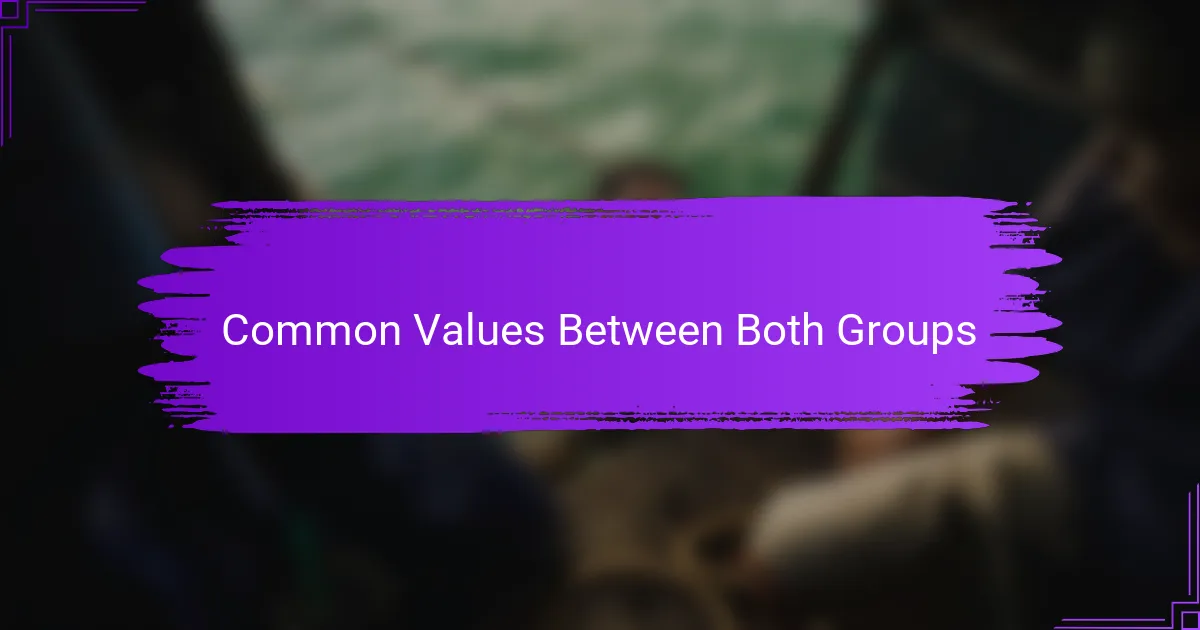
Common Values Between Both Groups
One thing that really stood out to me is how both the Salvation Army and the Obama supporter community share a deep commitment to uplifting others. I found myself reflecting on moments when I witnessed acts of kindness and service that weren’t just about charity or politics, but about genuine respect for every individual’s dignity. Doesn’t that kind of shared humanity make all the difference?
Both groups seem driven by a hopeful vision for a better world. When I think back to conversations with people in the Obama community and my experiences with the Salvation Army, there’s a common thread of optimism—even in the face of real challenges. It’s that belief that positive change is possible, rooted in action and compassion, which really resonated with me.
At their core, I believe both embrace inclusion and justice as non-negotiables. Engaging with the Salvation Army showed me how they welcome everyone without judgment, something I’ve also seen passionately championed among Obama supporters. That open-hearted approach feels like a shared value that strengthens both communities, don’t you think?
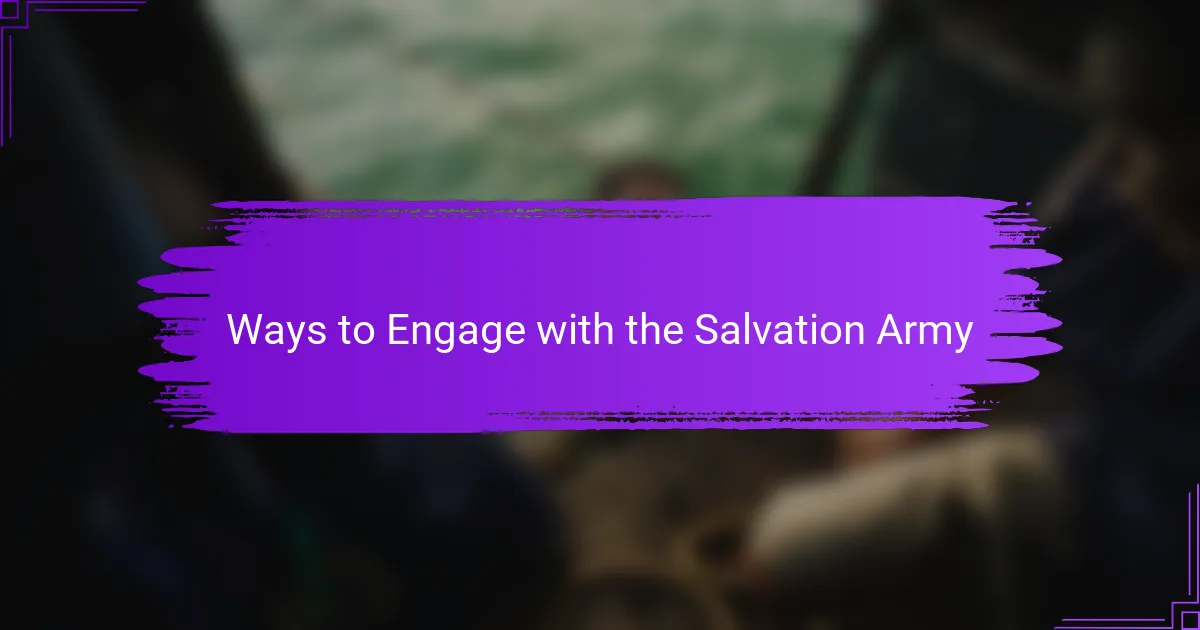
Ways to Engage with the Salvation Army
One way I connected with the Salvation Army was by volunteering at their local thrift store. The experience surprised me—I didn’t expect just sorting donations could feel so meaningful. Have you ever noticed how even small acts like folding clothes or chatting with customers can create real moments of connection and purpose?
Another powerful way to engage is by participating in their seasonal drives, like the Angel Tree or holiday meal programs. I remember the first time I helped wrap gifts for children in need; it wasn’t just about the presents, but the hope those small gestures carried. Do moments like these make you think about the ripple effect of kindness in a community?
Donating goods or funds is often the most accessible option, but for me, showing up consistently made the difference. Sharing my time and energy affirmed the Salvation Army’s mission in a way that felt deeply personal. Have you ever found that giving your presence amplifies the impact far beyond what money alone can achieve?
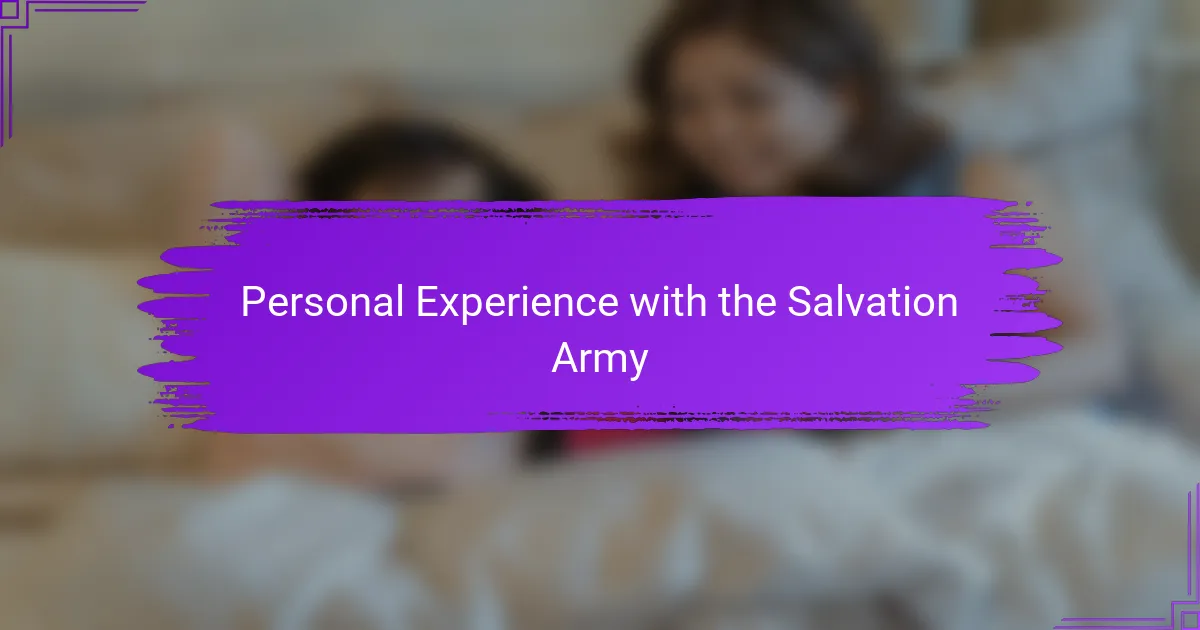
Personal Experience with the Salvation Army
The first time I volunteered with the Salvation Army, I was assigned to help at a shelter dinner. Seeing the relief and gratitude on people’s faces made me realize that their work goes far beyond handing out meals—it’s about creating a sense of community where no one feels invisible. Have you ever experienced a moment where a simple act of service felt profoundly human?
One afternoon, while sorting donations at the thrift store, I struck up a conversation with a regular customer. Hearing her story of resilience reminded me that the Salvation Army serves as a quiet but powerful lifeline for many facing struggles we often don’t see. It’s moments like these that made me appreciate the deep impact of their presence in people’s lives.
I also remember helping during a holiday event where children received gifts through the Angel Tree program. Watching their eyes light up was a touching reminder that the Salvation Army doesn’t just meet needs—they nurture hope and joy. Isn’t it inspiring to witness how small acts can ripple out and lift an entire community?
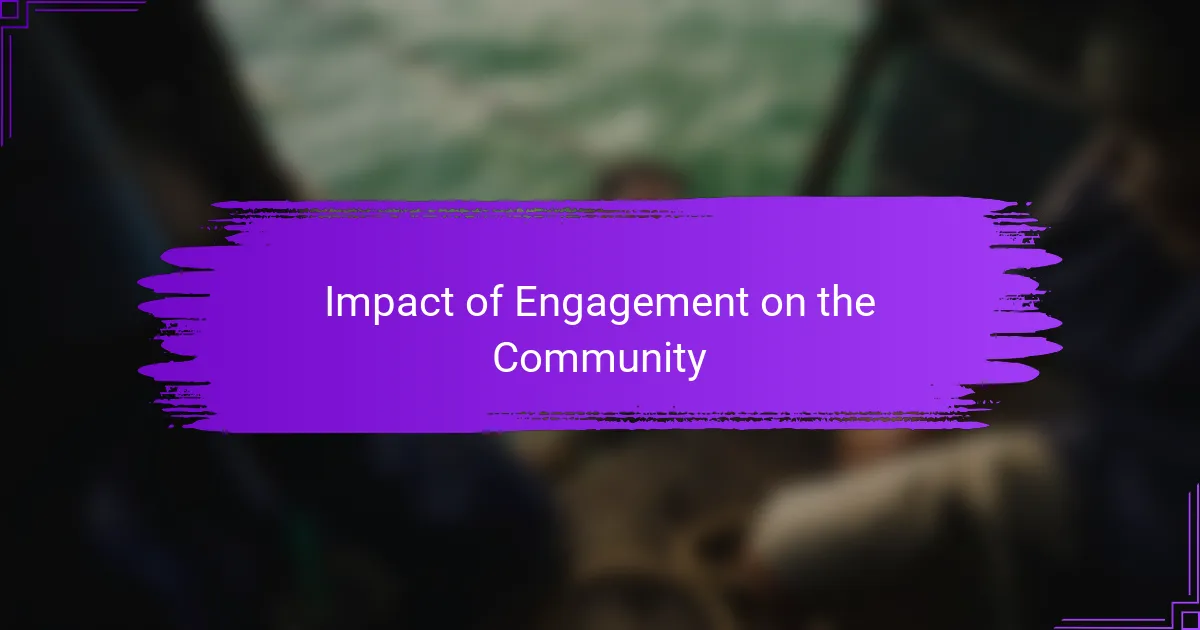
Impact of Engagement on the Community
Engaging with the Salvation Army showed me firsthand how community impact goes beyond meeting immediate needs. I recall one evening at the shelter dinner when the atmosphere shifted from just sharing food to sharing stories and smiles. Have you ever noticed how such moments can weave a stronger social fabric, making people feel truly seen and valued?
What struck me deeply was how this engagement sparked a ripple effect—neighbors began checking in on each other more, and new volunteers emerged inspired by simple acts of kindness. It made me think: isn’t that the true power of community? Small, consistent efforts fueled by genuine care can spark lasting change.
From my experience, the most profound impact lies in the dignity the Salvation Army helps restore. Watching individuals regain confidence and a sense of belonging reminded me that empowerment, not just charity, transforms communities. How often do we pause to recognize that fostering hope is as critical as providing help?
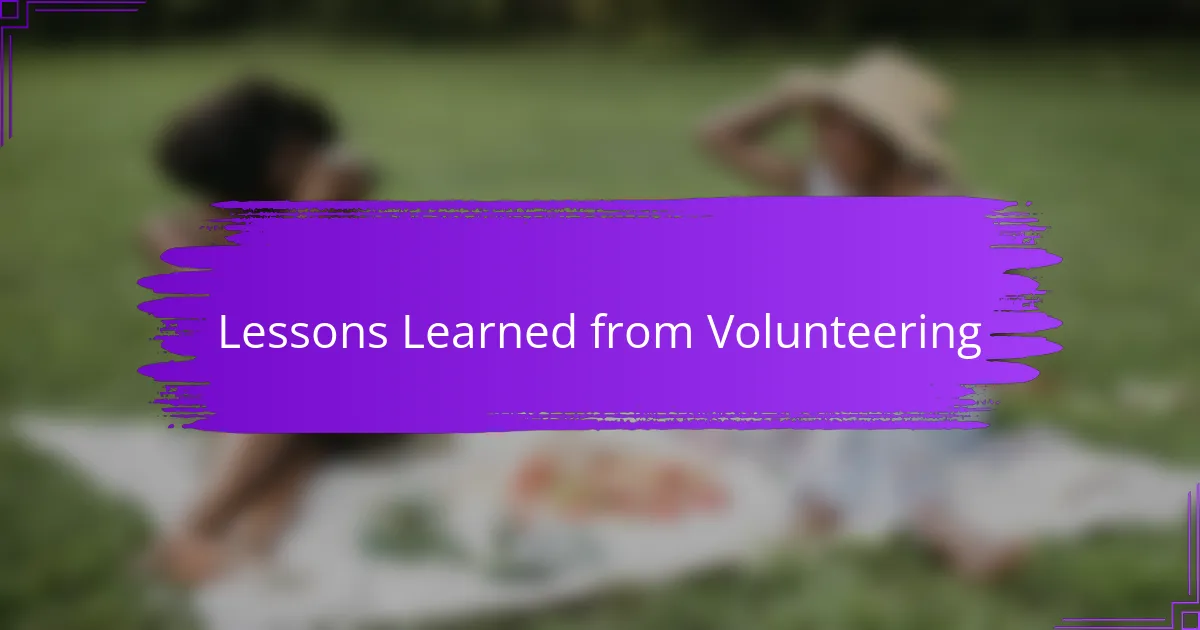
Lessons Learned from Volunteering
Volunteering with the Salvation Army taught me that true service requires more than just showing up—it demands empathy and patience. I remember feeling challenged when I first struggled to connect with some of the people I was helping, but over time, those moments turned into meaningful conversations that deepened my understanding of their experiences. Have you ever found that listening carefully can sometimes be the greatest gift you offer?
One lesson that stayed with me is how small, consistent actions build trust and community. It wasn’t the grand gestures but the daily routines, like sorting donations or serving meals with a smile, that made the biggest difference. That realization shifted how I view civic engagement—not as a one-time event but as a commitment to ongoing care.
Most importantly, volunteering showed me the power of dignity in service. Watching someone’s face brighten because they felt seen and respected reminded me why the Salvation Army’s approach resonates so deeply. Isn’t it inspiring how restoring hope can be just as important as meeting physical needs?

